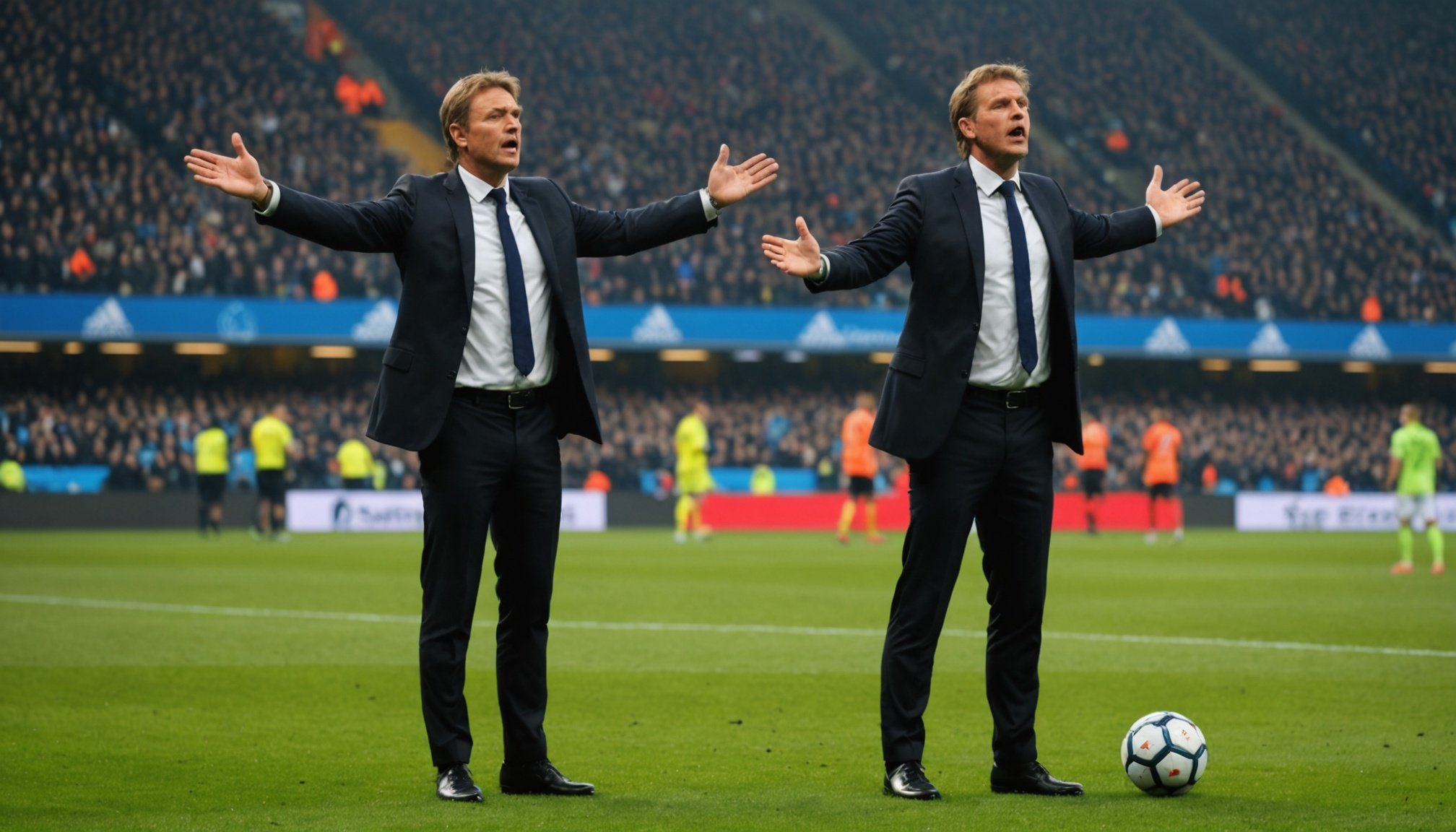Understanding the Impact of Controversial Match Decisions
Controversial match decisions can profoundly influence both players and coaching staff. The immediate emotional response can undermine player morale, leading to diminished performance and an unsettling effect on team dynamics. This drop in confidence might disrupt harmony, fostering frustration and dissatisfaction among athletes.
For coaches and management, the psychological impact shifts the focus from strategy and improvement to damage control. They often grapple with justifying decisions that feel out of their hands, which may create a stressful environment. This stress can, inadvertently, impact managerial decision-making, as it diverts attention from the on-field objectives to off-field distractions.
In parallel : Unlock your betting potential with the ladbrokes sign-up offer
Long-term consequences are significant when match decisions persistently affect a team. Morale ebbs, and the friction caused by controversial rulings can hinder team progress. In the grand scheme, repeated exposure to such decisions might necessitate changes in team strategies and squad practices to reinforce resilience.
Adapting to these influences becomes essential in maintaining a cohesive unit. Implementing tailored strategies to tackle the ripple effects on team dynamics can be pivotal. Successful management of these situations requires balancing critique acceptance with a focus on building robust psychological safety.
Building Team Resilience
In the face of controversial match decisions, fostering team resilience becomes crucial for maintaining a productive environment. Such resilience doesn’t just happen; it requires deliberate strategies and activities to nurture team cohesion, especially after a setback.
First, clubs can introduce regular morale-boosting activities. These might include team-building exercises or workshops focused on communication skills. By engaging players in non-competitive settings, they get opportunities to connect and support one another beyond the pitch, strengthening relational bonds.
Another critical aspect is mental preparation and focus. Coaches can incorporate mental resilience training into regular practice sessions. This can include mindfulness exercises or stress management workshops, laying a foundation for athletes to approach games with greater mental fortitude and adaptability.
Encouraging a growth mindset is equally important. In such an environment, mistakes and setbacks are viewed as opportunities for personal and professional development rather than as failures. Incorporating sessions where players can share their experiences and learn from each other helps foster this mindset.
Ultimately, by creating a culture of psychological safety, players are more likely to express concerns and propose solutions freely. This open dialogue can be pivotal in navigating the complexities brought about by controversial decisions.
Effective Communication Strategies for Managers
Communication strategies are vital when navigating controversial match decisions. Coaching staff and management face immense pressure and must engage players effectively to maintain morale. Transparency and honesty are pivotal. Offering clear, truthful explanations fosters trust and mitigates the psychological impact. Open dialogue, where players feel heard and supported, is essential in maintaining team dynamics. Managers should balance empathy with authority, nurturing a safe space for players to express concerns while underlining the collective goal.
When engaging with the media, crafting a coherent narrative is crucial. Media relations demand precision in addressing press inquiries, focusing on narrative consistency post-controversy. This approach safeguards the team’s reputation while enabling management to take control of communication. Utilizing social media effectively amplifies engagement with fans, turning potential public relations challenges into opportunities for enhanced connection.
Player engagement also requires a strategic approach. Coaches must employ techniques fostering dialogue that encourages feedback and transparency. Employing empathy enables management to better understand the players’ perspective, establishing a robust framework that respects both parties. By addressing these elements through refined communication strategies, managers can ensure that operations run smoothly, even in tumultuous times. This promotes an environment that is resilient and conducive to growth.
Public Relations and Management
Managing public relations during controversies requires a strategic approach and careful planning. Notably, developing an effective crisis communication plan is essential to guide the immediate response. This plan should outline key messaging, designate spokespeople, and ensure consistent communication internally and with the public.
Engaging meaningfully with stakeholders during controversies is critical. By maintaining open lines of communication with players, fans, and investors, a team can anchor its narrative and mitigate potential fallout. This engagement should focus on transparency, providing clear explanations and updates on the situation to maintain trust within the community.
In addressing reputation management, long-term strategies must be established. This involves regularly monitoring media coverage and public sentiment, allowing management to proactively address concerns and highlight positive team achievements. The goal is to rebuild and maintain a positive image across all public interfaces.
Utilising digital platforms, especially social media, to interact with fans presents opportunities for enhanced connection. By effectively curating online content, management can shift focus to community-building activities, sharing positive stories and milestones. Emphasizing these elements strengthens the bond between the team and its supporters and can mitigate the impact of any controversies. Efficient communication lays the foundation for sustaining a robust, reputable standing in the sports community.
Opportunities for Professional Growth Post-Controversy
Navigating professional growth post-controversy presents unique opportunities for teams and individuals to evolve. Recognising and leveraging such situations for self-improvement can lead to a strengthened framework for future challenges.
First, identifying areas ripe for development is crucial, both on a personal and team level. These could include revisiting and refining strategies that address team resilience and adaptability, especially in how they respond to match decisions. By examining past experiences, management can tailor development plans that focus on enhancing performance and morale.
Surprisingly, controversies often serve as catalysts for positive change. Teams can leverage these moments to explore constructive adjustments within their structure, enhancing communication and improving cohesion. Rather than viewing criticisms as setbacks, they can be seen as invaluable tools for professional growth, fostering a culture of lessons learned and self-improvement.
Finally, constructing a robust framework for future challenges ensures teams are better positioned to manage potential issues. Encouraging a culture of continuous learning and adaptability helps in building resilience, enabling teams to thrive regardless of external pressures. As teams grow and adapt, they can cultivate an environment where professional evolution and innovation take precedence, navigating the complexities of the sports landscape with confidence.
Analyzing Case Studies of Successful Managers
Exploring case studies of successful managers offers valuable insights into effective strategies post-controversy. Leaders who thrive in turbulent times often rely on adaptable, innovative solutions.
Impactful Leadership Examples
One notable example is Alex Ferguson, whose leadership at Manchester United exemplified resilience and strategic acumen. After controversial match situations, Ferguson maintained focus by fostering strong internal communication and encouraging team unity. He used setbacks as learning curves, cultivating a relentless pursuit of improvement among players.
Jose Mourinho is another manager who has successfully navigated controversies. His approach involves maintaining close relationships with players, showcasing empathy whilst exerting authority. Mourinho’s leadership style ensures players feel supported yet accountable, reinforcing a sense of responsibility and commitment.
Adapting Practices from Other Sports
Insights from different sports can also enhance managerial techniques. For instance, Phil Jackson, known for his success in basketball, emphasised a holistic approach to team management, integrating mindfulness and discipline as part of training routines. Drawing parallels from such strategies, football managers can incorporate cross-disciplinary techniques to boost team resilience.
Adaptability and innovation are crucial. Managers who seamlessly integrate lessons from various sectors can better tailor their approaches, ensuring their teams not only survive but prosper amidst controversies.










